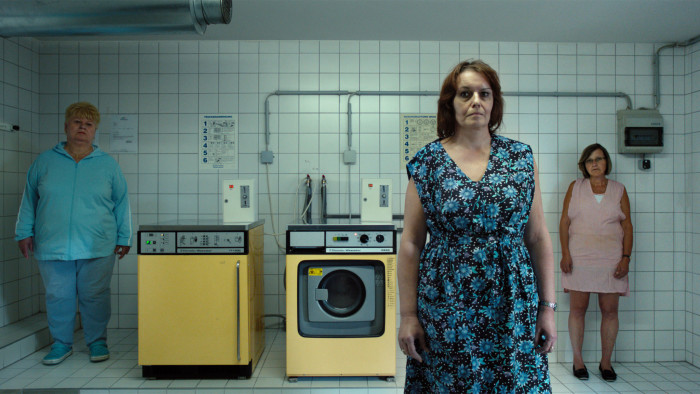The weird and wonderful at Venice Film Festival

Simply sign up to the Life & Arts myFT Digest -- delivered directly to your inbox.
Death happens all the time in art, often to the good. After 10 days at the 71st Venice Film Festival, cinema could surely say, contra Mark Twain: “Reports of my death are greatly understated.” But that is still no cause for mourning. Rather of exultation in new life and new life and art forms.
Death-of-cinema moment number one: the best thing I saw in the second week at Venice was not a film at all but a TV miniseries shown on the big screen, the superb Olive Kitteridge (read on). Death-of-cinema moment number two: the most hypnotically weird work I have encountered is Near Death Experience, an essay in near-actionless non-cinema, even anti-cinema, by Benoît Delépine and Gustave Kervern (Aaltra, Mammuth) about the suicidal thoughts of a mountain-rambling biker/hiker played by author Michel Houellebecq.
To amplify the death-of-cinema buzz, commentators have been crying that the big American movies have deserted Venice this year. Partly true. But even if wholly true, would that be a sign of demise or of divergence and rejuvenation?
I can show you resurrection certificates too. Despaired-of film-makers have found new form, notably Alejandro González Iñárritu (Birdman, see last dispatch). And form itself has brightened up to pose the question: “What is a film?” Is it just a feature drama or documentary? Or can it be an essay, a cine-poem, a soliloquy, a private or polemical discourse – like Near Death Experience or that unclassifiable nonfiction tour de force reviewed in my last report, Joshua Oppenheimer’s The Look of Silence – or even a chunk of TV serialisation?
Olive Kitteridge is four hours of Pulitzer Prize book adaptation directed by Lisa Cholodenko (The Kids Are All Right) from Elizabeth Strout’s novel of agony, ecstasy and just-chugging-along in a Maine family of three. Tragedy; comedy; small-town pastorale. I usually hate literature on telly but this page-to-screen conversion is a winner: domestic and socio-civic miniaturism as sharp as a gemstone and as brightly burning as Bergman.

Frances McDormand plays the hapless heroine: a snappish, intolerant, long-suffering wife and mother-of-one. Emma Bovary; Hedda Gabler; mix the two together, then add the wear and tear of coastal years in a story covering decades. Nothing is ordinary here, even in a sea of New England ordinariness: not even Richard Jenkins as a pained pharmacist and mouse of a spouse who bites back when bitten once too often in a brilliant scene of horror in a hospital hostage incident.
It looks stunning, with a sheeny realism gorgeous and nightmarish like a master copyist’s Edward Hopper. Hardly surprising: the cinematographer is David Lynch’s Frederick Elmes. McDormand herself is amazing. You really do need to go to Bergman – to the Liv Ullmanns or Ingrid Thulins of Ingmarworld – for a comparison.
Near Death Experience doesn’t make friends easily. At the Houellebecq-attended press screening a dribble of applause, mustered, one suspects, from politeness, greeted the close. Here are 87 minutes of a man and a voiceover on a pile of rocks. Houellebecq, in orange cycling gear, plays “Paul”, a France Télécom worker, who muses about life, death and killing himself.
He wanders the mountain in sometimes ill-focused long shots, punctuated with unnerving close-ups. Heaping stones, he builds cairns to his wife and children and talks to them. He also talks at length to two ants carrying twigs. In one shot he is spreadeagled upright and motionless against a rock face, in a solemnly zany crucifixion. For me this mad, narrativeless journey into prehistory and precognition gets more mesmerising as it goes along. Bold of Houellebecq to undertake it? Perhaps. But being a cultural enfant terrible is a high-maintenance mystique. You probably have to keep finding new ways to surprise or startle your fans.
How on earth, talking of new film forms, does one define or describe Ulrich Seidl’s In the Basement? The Austrian cine-poet of sin, sex and suburbia (Dog Days, the Paradise trilogy) gives us a blend of fiction and documentary that wriggles like a fish on a riverbank. Is it fully captive and under his control, this “nonfiction” record of the eccentric, even unspeakable things people do in their homes below-ground, from neo-Nazi drinking parties to rifle-range practice to S&M? Or is it still alive – that is, inventing itself as it goes along? (Seidl has confessed that the middle-aged woman seen cuddling hideously lifelike toy babies in her basement never actually did this.)
Hard to answer. Sometimes, even hard to watch. Homely suburban masochists, married or otherwise, excruciate each other’s bodies in below-stairs bondage rooms. Gun nuts meet to drink and get nostalgic about Hitler. This may be Seidl’s best work. Provocative, funny and shocking: starkly confrontational one moment, mischievously ambivalent the next.
You could throw some of the same words at Roy Andersson’s A Pigeon Sat on a Branch Reflecting on Existence. This Swedish film-maker has long been unplaceable, a droll deadpanner of circus surrealism whose “ordinary” settings – streets, cafés, offices (all studio-built and painted in pale pastels) – play host to extraordinary alternations of white-faced Beckettian stasis and three-ring Dadaism. The new film, concluding a “trilogy” we barely even knew was one, has moments of inspired lunacy. Two itinerant toy sellers quarrel like an old married couple. Centuries clash as Charles XII of Sweden, leading his army, stops at a contemporary café for a loo break. Sailors and hostess burst into song in Limping Lotte’s bar. It’s often laugh-out-loud funny. What does it all mean? God knows; though He’s the only one not in it.

Conventional narrative cinema also showed up, once or twice, at Venice. Best from Hollywood in last days was Good Kill, written and directed by Andrew Niccol (Lord of War). In the age of drone fighters the term “war games” has taken on a new meaning. Pilotless planes are operated with PlayStation-style joypads from impregnable homeland bases. Here it’s Las Vegas, gaming capital to the west. Drone officer Ethan Hawke is nagged by a conscience that says battle should be man to man, or manned plane to manned plane. Is no-risk warfare moral, decent, proper?
Niccol’s dialogue is packed with small explosives. “Sir, why do we wear flysuits?” Hawke asks with malign irony of his sometimes-no-less-sceptical CO (Bruce Greenwood), subtly shrapnelling the complacency of a military masquerade in which They get blown to pieces and We go off and have a beer. The film is compact, peppy, topical, well-crafted, though outside the base it strays at times into domestic triteness.
Film-makers who die go to that afterlife called film biography. Not always biopics. Neither Ron Mann’s Altman nor Abel Ferrara’s Pasolini is a dramatised life story. Ferrara and scenarist Maurizio Braucci recreate a single day in the Italian writer-poet-director’s life – his last – combining imagination and fact in a jigsaw whose final piece is the murder on the Ostia beach. It’s a bitty, frustrating movie, allusive and elusive, though Willem Dafoe gleams persuasively behind the well-known specs and square-jaw features.
Altman is a documentary served straight up, with one olive (Shelley Duvall seen rescuing Popeye, as Olive Oyl) and the swizzle stick of a round-robin question to interviewees. “What does ‘Altmanesque’ mean?” each is asked. Best answer comes from Altman’s one-time leading man Elliott Gould (M*A*S*H, The Long Goodbye). “Life, liberty and the search for truth.” That’s it in a handful of words. What more do we want from films, film-makers or an international film festival?
Nigel Andres: Venice Film Festival – first report
Ethan Hawke photograph: Lorey Sebastian
Comments